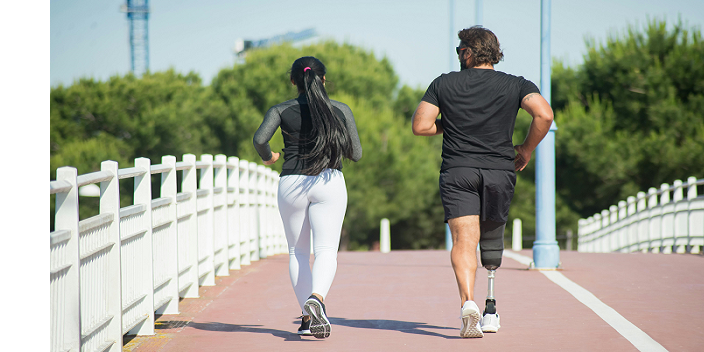
Lunch Restaurant in sydney
04 Nov 2025

The room was full of celebration—cake, music, even streamers—but the silence between Maria and her brother Anthony felt like a black hole. It was his “walking day,” the day he was to take his first steps with a prosthetic leg. Everyone cheered, but Maria noticed the wince he tried to hide with a smile, the microsecond hesitation before standing. It wasn’t about walking. It was about everything he had lost before that moment.
Supporting a loved one through limb loss isn’t about clapping when they walk again. It’s about surviving the moments when they don’t want to be, when they cry while showering for the first time alone or look at themselves in a mirror and say nothing.
What We Don’t Talk About — The Void
In America alone, over 2.1 million people live with limb loss. And yet, the emotional landscape of amputation remains largely uncharted territory. Society celebrates the “comeback,” but buries the breakdowns. The real struggle lies in the quiet, not in overcoming the physical challenge, but in navigating the grief.
The first days after the loss are filled with platitudes and awkward sympathy. You’re told to “be strong for them.” But what does that even mean when your loved one stares blankly at their phantom limb, trembling with rage or despair?
Maria said, “It felt like I was walking on eggshells made of glass. I didn’t know whether to hug him or sit in silence. I wondered if I was doing too much… or not enough.”
The Role of the Caregiver: The Unseen Amputation
No one tells the caregiver that they, too, undergo a kind of amputation—a loss of predictability, freedom, and sometimes identity. In a blink, you’re no longer just a sister, spouse, or friend. You’re a nurse, a cheerleader, a punching bag, a GPS for appointments, a translator for medical terms, and occasionally, the emotional landfill for their frustration.
“We are trained to recognize visible trauma,” says Dr. Elena Marshall, a trauma-informed physical therapist in Chicago. “But the invisible wounds — survivor’s guilt, caregiver fatigue, emotional paralysis — those often go untreated, even unnoticed.”
The key is not to fill the silence with noise but with presence. Sometimes, support means sitting next to them without offering advice. Sometimes, it means making space for their anger without taking it personally. And sometimes, it means just admitting, “I don’t know how to help, but I’m here.”
Prosthetics Are Not a Magical Fix
The media loves a “tech miracle” story — someone running a marathon with a carbon-fiber blade. But these portrayals set unrealistic expectations. A prosthetic is not a replacement. It’s a tool that takes time, patience, and often pain to master.
Imagine breaking in a new pair of shoes. Now imagine doing it with a wound that never fully healed, on a leg that no longer exists. That’s what every step in a prosthetic feels like in the beginning.
Orthotist Stuart Weiner describes it this way: “They don’t just relearn how to walk. They relearn how to trust their own body. It’s like trying to drive a car with a steering wheel that jerks every few seconds.”
And here’s the part that hurts, sometimes the journey toward independence increases emotional distance. As your loved one reclaims autonomy, they may push you away — not out of ingratitude, but out of the desperate need to feel capable again.
When Words Become Landmines
Though well-meaning, there’s a minefield of phrases that can cause real harm.
“At least you’re alive.”
Invalidates the grief. Survival doesn’t negate suffering.
“You’re so strong.”
It may come off as pressure, a directive to hide weakness.
“You’ll get used to it.”
Normalizes something that may never feel normal.
Instead, try:
“I can’t imagine what this feels like, but I want to be here with you.”
“What do you need most today?”
“Would you like to talk, or should I just hang out with you?”
Small words. Big impact.
The Power of Patience (and Chocolate)
Anthony once threw his prosthetic across the room after failing to balance. Maria brought him a Snickers bar and said, “If you’re going to break something, at least eat first.” They laughed — for the first time in weeks. Humor can be oxygen when the emotional air gets thin.
Support often looks less like a dramatic gesture and more like showing up consistently. For example, driving them to the fourth fitting appointment even though the last three were canceled, or waiting outside the therapy room for hours because they finally decided to walk two extra steps.
Embracing the New Normal (Without Forcing It)
Healing doesn’t mean returning to who they were but redefining who they can become. Support isn’t about dragging them back to “normal.” It’s about walking beside them as they create something new.
Maria eventually learned that her brother didn’t need a savior—he needed a witness—someone who could stand beside him and say, “You don’t have to pretend it’s okay.”
And eventually, Anthony did walk again. Not with the same ease. Not with the same leg. But with the kind of courage that deserves more than a standing ovation. It deserves understanding — and presence.
Nouveau Prosthetics & Orthotics has been a national pacesetter in orthotic and prosthetic rehabilitation for over four decades. We know that each patient is valued as a unique individual whose potential for function and/or mobility will be improved through skilled care, advanced technology, and innovative solutions. Our energies are directed at a single goal: to help achieve each individual’s highest ability level. Nouveau provides extensive prosthetic and orthotic services and rehabilitation specialties for patients of varied ages and disability types. Stuart Weiner, CPO, owns and operates the Cranial Center, certified by the American Board of Certification in Orthotics, Prosthetics, and Pedorthics. Our facilities are conveniently located across New Jersey: Hackensack, Hazlet, and Morristown. Call 800 685 9116 for a complimentary consultation.

04 Nov 2025

04 Oct 2025

08 Jul 2025

08 Jul 2025

08 Jul 2025